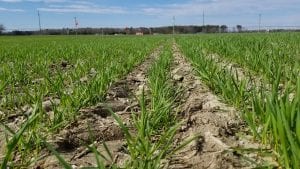Phillip Sylvester, Extension Agent – Agriculture, Kent County, philllip@udel.edu; Jarrod O. Miller, Extension Agronomist, jarrod@udel.edu; Cory Whaley, Extension Agent – Agriculture, Sussex County,whaley@udel.edu; Amy Shober, Extension Specialist – Nutrient Management and Environmental Quality,ashober@udel.edu; Mark VanGessel, Extension Weed Science Specialist, mjv@udel.edu; Bill Cissel, Extension IPM Agent, bcissel@udel.edu; and Alyssa Collins, Extension Plant Pathologist (Penn State),collins@psu.edu
Winter wheat and barley planting season will be here soon. Now is a good time to review yield, test weight, and disease resistance data from land-grant university variety trials. This data will help you select varieties adapted to our region. Seed may be in short supply this year, so be sure to inquire about availability as soon as possible. Here are some suggestions to help you get the most out of your small grains as we head into the fall.

